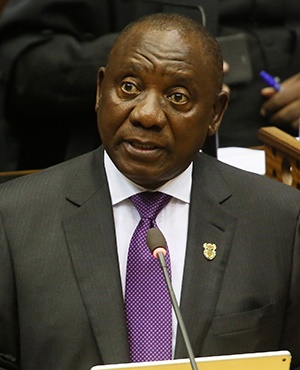Cyril Ramaphosa’s presidency has been likened somewhat to destiny. Nelson Mandela preferred him as his deputy, but Thabo Mbeki proved the popular choice among senior leaders of the ANC. Mandela’s preference was understandable. Ramaphosa had led negotiations that yielded a peaceful transition.
Ramaphosa’s presidency has been greeted with a sense of inevitability; not because of the expectation that he’ll restore Mandela’s leadership style.
South Africa has gone through nine years of misrule. Institutions need rebuilding and public confidence and spirit require lifting. A messiah-like figure, in the same mould as Mandela, is needed. That’s what people see in Ramaphosa.
The significance of Ramaphosa’s presidency, however, lies not in mimicking Mandela. The status quo demands that Ramaphosa charts a new path, which requires disappointing a powerful constituency that currently hails him as a messiah. This is unavoidable as he seeks a permanent solution to the tension, arising out of the
(im)balance between redress and reconciliation that continues to trouble the republic. While seeming contradictory, both these are foundational values that not only birthed the democratic republic, but also safeguard its future.
Because redress offers reparation for the injustices of the past, it secures the future by enabling reconciliation. In turn, reconciliation optimises our prospects of becoming a stable society. These foundational values are, therefore, complementary. A lot of people, however, disagree. Their disagreement arises from refusal to surrender part of the privileges that were accrued through an unjust system. Thus they look at reparations as vengeance.
Mandela was the first one thrust by history to resolve this historic tension. The demands of the moment nudged him towards overemphasis on reconciliation. He urged black folk not only to forgive, but also to allow for the retention of symbols of exclusion. Mandela did all this at the risk of encountering displeasure from his own supporters, who had been victims of racial discrimination. Some whispered that he was a sellout.
Not that he did not seek redress. He figured that forgiveness would pave the way for redress. Mandela thought the privileged would reciprocate with restitution. That did not happen.
Mbeki inherited an even more intransigent privileged class. Business delisted from the Johannesburg Stock Exchange for international listing only to bad-mouth South Africa’s equity measures as racist.
Mbeki had been welcomed by the privileged class as a continuation of Mandela’s presidency. Having spent a large part of his adult years in the UK, where he was educated, Mbeki was considered by the privileged class as one of their own. They were comfortable in his company. They did not think Mbeki would upset the apple cart, unlike the fiery Chris Hani, a raving communist.
However, Mbeki couldn’t ignore the persistent racial inequality. When he did speak out, especially in his speech, One country, two nations, he was denounced as a racist. The very constituency that had embraced him as sophisticated could no longer stand him. His fault was reminding them of their constitutional obligation towards redress.
What I’m saying, therefore, is that the euphoria that greeted Ramaphosa’s inauguration is not new. We’ve been here before. Of course, some of the elation is genuine. The nightmare that was Jacob Zuma’s presidency is gone. But, part of the euphoria is self-serving. As they did with Mbeki, the privileged class considers Ramaphosa a kindred spirit. He is wealthy and connected to the established white business.
However fond the privileged class is of Ramaphosa, he too is forced to confront the vexing challenge of redress. The agenda was predetermined at the recent conference that elected him president. He has no choice but to pursue his party’s resolution to expropriate land without compensation. But how far will he press the issue and can he endure the backlash?
The backlash is not evident yet. It may be that the privileged class is still relieved Zuma is gone. The more Ramaphosa talks about taking private property without payment, however, the more attention will start shifting towards its implications. That’s when we’re likely to see some backlash. Ramaphosa cannot be accused of polarising the country and risking an economic meltdown. Such denunciations will force Ramaphosa to make a decision that will have a defining effect on his presidency: Does he convince his party to back down or lead the privileged class into a new economic dispensation?
As with Mandela, Ramaphosa now enjoys enormous goodwill. Mandela used it to elicit forgiveness from blacks, while accepting deferment of redress. The benefit was an opportunity to start building a nation. Nation-building, however, is stifled in the absence of redress. This is the challenge of Ramaphosa’s presidency: to consolidate nation-building through redress. It may well be that he is best suited for this task. His involvement in business could give him the credibility to convince business and commercial agriculture that redress makes economic sense.
Getting the financial establishment to give up some of its interests will not be an easy task. Its instinct is to optimise, rather than shed. Political contestation will not make it any easier either. Ramaphosa’s main rival, the DA, has already presented his proposal as mindless property grab. Ramaphosa’s message will have to be equally vociferous. It must be a campaign that extends beyond occasional remarks in Parliament. Just as Mandela did with his repeated message of forgiveness among black folk, so must Ramaphosa do with the message of redress among white folk.
Consent from business is preferable to hostility. Part of getting this consent is adopting expropriation without compensation as the last resort. It must be preceded by an offer of a state-determined prize. Outright expropriation without compensation has disastrous consequences. Zimbabwe is an example of that. We may be aggrieved, but that’s no excuse to be stupid. This is the challenge that awaits Ramaphosa: to combine redress and reconciliation. If he can achieve that, history will remember him as more than just a Mandela wannabe, but as a truly transformative figure.
- Ndletyana is associate professor of politics at the University of Johannesburg



























